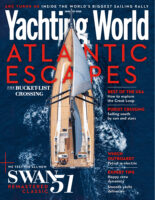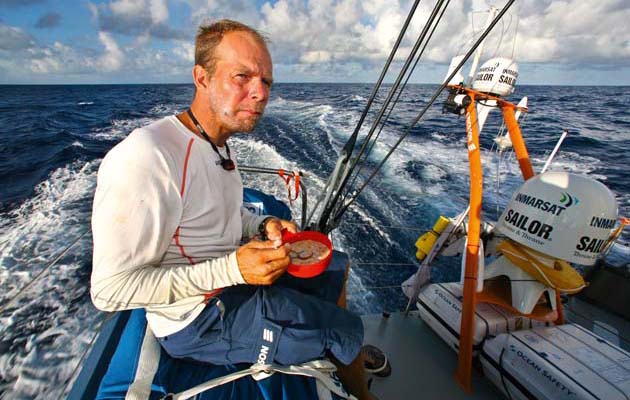Pip Hare on on how to feed yourself and crew when sailing fast offshore.
Your diet offshore should be as good as, or even better, than it is at home. As with any sport, nutrition and hydration are essential for maintaining good performance. The 24-hour nature of short-handed sailing is a lot more demanding than the average land-based day, so eating patterns should reflect that.
How do you provision for a crew for three weeks or more at sea?
Whether you are competing or cruising, a balance of carbohydrate, protein and fat is required to keep a constant supply of energy and help your muscles and brain to recover.
Eating four smaller meals a day will help level out your calorie intake over time and also guard against that dozy feeling after eating a big meal. Eating together gives double-handed crews a valuable time to talk, so I normally eat a midday and evening meal with my co-skipper, and will manage my own breakfast and a second hot meal in the early hours of the morning. Quite often I will split a larger evening meal into two and reheat the second part on my early-morning watch.
For those that are keen, making meals at home and vacuum-bagging them is great. For the rest of us, freeze-dried meals or microwavable pouches (which can be heated up with boiling water) can also offer a variety of good, well-balanced meals.

Freeze-dried and vacuum-packed meals are easy to stow and prepare although, if the budget allows, a Jetboil is simpler and quicker to use than a kettle.
Don’t pack food you don’t like: try before you buy. Get hold of a few samples of any freeze-dried and prepared food products before you commit to buying lots. Avoid over-processed ready-meals and check the labels to avoid meals that contain large quantities of sugar and salt. As a rule of thumb I am suspicious of anything that has a lot of unrecognisable ingredients.
Bluewater cruisers give us their top pick of galley equipment
Snacking is good for morale and for maintaining energy levels. Make sure you have a selection to hand when on watch. Sugary foods should be avoided, as they will cause a short-term spike in energy levels followed by a slump, which, personally, makes me feel cold, tired and really grumpy. Instead, consider dried fruit and nuts, cereal bars, chopped-up fresh fruit or a sandwich cut into
halves or quarters.
It is really easy to get dehydrated when sailing: short bursts of activity when fully layered-up can lead to sweating, while in cold conditions you don’t always feel thirsty, and going to the heads can often be such an ordeal that some may deliberately avoid drinking. Dehydration can lead to tiredness, muscle cramps, insomnia and decreased physical and mental performance, particularly around decision-making, so drinking enough should be a top priority.

January 23, 2015. Leg 3 to Sanya onboard Team Brunel. Day 20. Skipper Bouwe Bekking avoiding dehydration.
It is easy to monitor how hydrated you are from the colour of your pee – it should be light. Keep a bottle of water on deck and take regular sips during your watch (this will help to keep you awake) and after any activity on deck. Aim to drink at least two or three litres of water per day including in warm drinks. Electrolyte or sports drinks can be good in hotter climates to balance any minerals you have sweated out, but keep a close eye on how much sugar they contain. Plain water is often best.
Top tips for nutrition at sea
- Empty freeze-dried food into a wide-neck Thermos flask then add boiling water and do up the top. The food stays warm and can be snacked on for a couple of hours
- Consider buying a Jetboil; it will heat water in under two minutes making hot drinks and freeze-dried meals quick and easy
- Label water bottles with each crew member’s name to monitor how much they are drinking
- Porridge with milk is an excellent breakfast or midnight boost, providing proteins, fats and slow release carbohydrate
- Ginger or peppermint teas provide natural stimulation without the slump that can be created by caffeinated drinks
Ocean-bound – experienced skippers offer their advice on ARC preparation.




